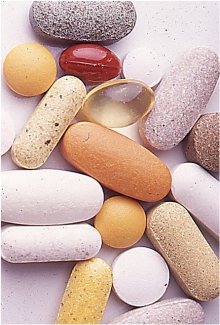18 February 2009
Scientists cast doubt on role of free radicals in aging
by Kate Melville
 For nearly half a century, the prevailing dogma as to why we get old has been tied to what is called oxidative stress. The theory is that when molecules like free radicals, oxygen ions and peroxides (collectively known as reactive oxygen species, or ROS for short) build up in cells, they overwhelm the cells' ability to repair the damage they cause, and the cells age.
For nearly half a century, the prevailing dogma as to why we get old has been tied to what is called oxidative stress. The theory is that when molecules like free radicals, oxygen ions and peroxides (collectively known as reactive oxygen species, or ROS for short) build up in cells, they overwhelm the cells' ability to repair the damage they cause, and the cells age.
Pandering to this notion, an industry of "alternative" antioxidant therapies - such as Vitamin E or CoQ10 supplements in mega-dose format - has sprung up. But to date, clinical trials have not shown that these treatments have statistically significant effects.
And now researchers at McGill University, in a study published in the journal PLoS Genetics, are calling the entire oxidative stress theory into question. In fact, the results show that some organisms actually live longer when their ability to clean themselves of this toxic molecule buildup is partially disabled.
Dr. Siegfried Hekimi of McGill's Department of Biology, said most of the evidence for the oxidative stress theory is circumstantial, meaning oxidative stress could just as easily be a result of aging as its cause. "The problem with the theory is that it's been based purely on correlative data, on the weight of evidence," explained Hekimi. "It is true that the more an organism appears aged, whether in terms of disease, or appearance or anything you care to measure, the more it seems to be suffering from oxidative stress. This has really entrenched the theory because people think correlation is causation. But now this theory really is in the way of progress."
To compile their findings, Hekimi and co-researcher Jeremy Van Raamsdonk studied mutant Caenorhabditis elegans worms. They progressively disabled five genes responsible for producing a group of proteins called superoxide dismutases (SODs), which detoxify one of the main ROS. Earlier studies seemed to show that decreased SOD production shortened an organism's lifespan, but Hekimi and Van Raamsdonk did not observe this.
None of their mutant worms showed decreased lifespan compared to wild-type worms, even though oxidative stress was clearly raised. In fact, one variety actually displayed increased lifespan. "The mutation that increases longevity affects the main SOD found in mitochondria inside the animals' cells," said Hekimi. "This is consistent with earlier findings that mitochondria are crucial to the aging process. It seems that reducing mitochondrial activity by damaging it with ROS will actually make worms live longer."
The researchers hastened to point out, however, that oxidative stress is unlikely to be good for you. "ROS undoubtedly cause damage to the body," Hekimi explained. "However, they do not appear to be responsible for aging."
Related:
Epilepsy Drugs Slow Aging
Anti-Aging Finding Turned On Its Head
More Evidence Of Link Between Reproductive System And Aging
Antidepressants add years to your face
Source: McGill University
